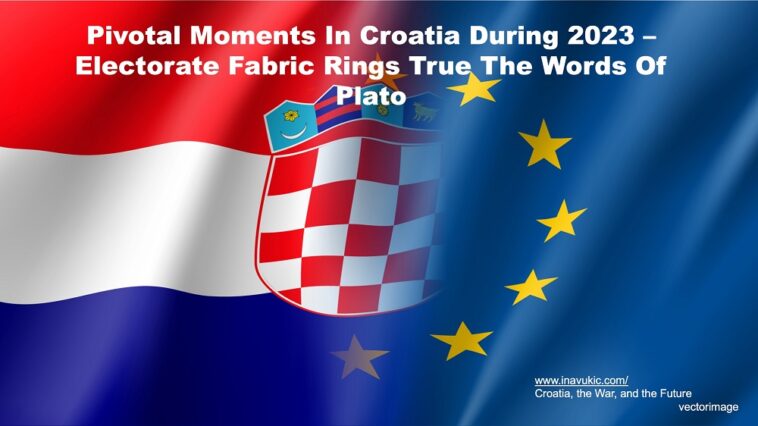2023 was a stormy year on the domestic political scene in Croatia.
Multiple Government Ministers’ downfalls amidst corruption scandals
As the precursor to this, the super election year that 2024 is earmarked for, 2023 was marked by turmoil and conflicts between the political life participants and participating hopefuls, and there was no shortage of scandals in the field of corruption.
Over the past seven years or so, numerous ministers have left Andrej Plenkovic’s government many of which he personally dismissed or who left of their own accord, heavily burdened by corruption affairs that erupted during their mandate such as Pavo Barisic, Martina Dalic, Lovro Kuscevic, Gabriela Zalac, Tomislav Tolusic, Nada Murganic, Milan Kujundzic, Darko Horvat, Tomislav Coric, Josip Aladrovic, Boris Milosevic… During its mandate this HDZ-led government has seen the turnover of around 30 new ministerial appointments and this in anyone’s books is surely excessive and symptomatic of badly run government or, rather, badly run audits, checks and balances which, if done properly and independently ensure discovery of corruption and misappropriation whether small or large-scale. The HDZ-led government started 2023 with a new personnel crossword puzzle. Minister for EU Funds and Development Natasa Travisak was sacked without any convincing explanation and replaced by Sime Erlic, and Minister for Reconstruction Ivan Paladin was sacked without an explanation and replaced by Branko Bacic who was hailed by the government as the person who would finally accelerate the reconstruction after the significantly devastating earthquakes of 2020 that affected Zagreb through Sisak to Petrinja, throughout Banovina, where the damage from the earthquake forced tens and tens of thousands of people into temporary accommodation, including shipping containers. A new law on reconstruction was passed and thus Croatia was able to use the funds from the solidarity fund. The new Reconstruction Act entered into force at the end of February 2023. And with the administrative relief of the process, which simplified the treatment of citizens and all stakeholders involved in the reconstruction process, brought improvements to the self-renewal model and new models and approaches in reconstruction, as well as the unique action of key bodies for reconstruction within one management.
After a traffic accident with fatal consequences in November 2023, the culprit of the accident, Minister of Defence Mario Banozic, was replaced by Ivan Anusic. Damir Habijan, who was voted in at the extraordinary session, succeeded Minister of Economy and Sustainable Development Davor Filipovic was replaced in December 2023 together with his advisor Jurica Lovrincevic amidst the “Mreža/ Network Scandal” which sparked concerns over possible public fund misuse through advertising conducted by state-owned companies and institutions across various media outlets. The possibility of funds being covertly diverted under the garb of advertising services has raised many an eyebrow.
The European Public Prosecutor’s Office (EPPO) in Zagreb had launched a new investigation against the former minister of the Ministry of Regional Development and EU Funds (MRRFEU), Gabrijela Zalac, who is suspected of ordering that her private expenses in various catering and hospitality establishments be paid for using public money.
Too Many Political Parties in pre-election year rings true the words of Plato
Although not a pivotal moment during 2023 for Croatia the ever-increasing number of registered political parties in a small country like Croatia, where the total number of eligible voters who either reside in Croatia or in the diaspora barely scratches the figure of 4.5 million, too many political parties competing for votes can be a double-edged sword. Logic tells me that the fewer parties there are, the greater the chance to have opposition parties that can win elections and govern, especially at national level. The number of political parties that have registered in Croatia simply pulverises any opportunity for any opposition to win the national elections. Unless of course, some of them mobilise the silent and non-voting voter majority to cast a vote at elections. Parliamentary and Presidential elections during the past two decades in particular, have seen significant dwindling in voters that turn up to polling stations domestically and abroad and any political parties that wants to change in their favour the outcome of elections and away from the usual bias towards either HDZ or SDP would do well embarking upon widespread grassroots campaigns to make known its skills and determination if it won government. The two main parties that have held power in Croatia since its independence in 1991, HDZ and SDP, need serious threats, politically. The truth is there are simply too many political parties leading votes being diluted at national and regional levels. In a way, this plethora of parties standing for elections, is akin to painting oneself in a corner with the nation having to be governed by one party for many years to come.
That the state of Croatian nation is in political turmoil and distrust for survival and better living standards on all fronts including political, judicial and economic can be seen through the enormous number of political parties with 4 new ones registered during 2023 (perhaps even more) – Republika (Republic), Hrvatsko bilo (Croatian Pulse), Javno dobro (Public Good) and Akcija za promjene (Action for Changes)… making that a total of about 172 political parties, majority vying for votes at elections and many contributing to the fact that the very concept of a political party is losing on importance as people have lost count of them all, voters’ choices blurred to the point that placing a vote for the majority that do not turn up is like an exercise of stabbing on the electoral lists blindfolded, caught up in the ridiculousness and hopelessness of it all.
The situation Croatia found itself at the end of 2023 reminds me what Plato, the Greek philosopher said more than 2 000 years ago when he stated that “one of the penalties for refusing to participate in politics, is that you end up being governed by your inferiors.” And participation is not only defined by the turnout numbers at elections but also by the conclusion that there is something substantially and drastically wrong when the smaller political parties cannot find it prudent to unite so that a viable opposition party or parties capable of governing at any given because they would be able to win votes easily.
Yet another attempt by former communists to derail government support for the Catholic Church in Croatia
In addition to significant political changes, there were also changes in the church ranks with Archbishop of Zagreb, Cardinal Josip Bozanic, being succeeded by Monsignor Drazen Kutlesa. That ex-communists are digging their heels deeper and deeper in Croatia, a country independent from communist Yugoslavia, is also shown by the repeated attempt to disperse the Catholic Church and its financing, and not even a little clamour against the huge financing of the Serbian Orthodox Church and its satellites in Croatia, as demonstrated by the month and December 2023. Anka Mrak Taritas (Glas political party) proposed to start the process of negotiations on contract changes in the field of education and culture, economic and legal issues, and the pastoral care of Catholic believers, members of the military and the police – that is, all four documents signed back in the nineties of the last century. She believes that the contracts are unconstitutional because they violate the equality of citizens before the law, but also that the circumstances have changed since the signing. The government immediately expressed its opinion on this initiative and said that ‘there is no basis for entering into changes to the contracts because there has been no significant change in the circumstances in which they were concluded, so there are no formal legal conditions for proposing their changes’. And the debate in the Parliament took place in the expected direction: a large part of the left (with the exception of the Social Democrats) supported Mrak Taritas, while the ruling party and the right opposed it. I fear though, this is not the end of attempts to degrade and derail government dupport for the Catholic Church in Croatia just as communist Yugoslavia did.
2023 – a year of big protests paralysing health services and judiciary; a mixed bag of troubles
2023 in Croatia was also the year of escalated fights for higher wages and this escalation of worker dissatisfaction became most apparent with medical doctors’ protest and the judges’ and judicial officers’ white strike, which lasted in excess of two months and paralysed the judiciary. This is why President Zoran Milanovic requested an extraordinary session of parliament in the middle of summer, July 2023, and the cause was also the “gas-for-cent affair”. The gas-for-cent scandal broke out after it was found that the national energy company HEP had sold surplus gas at rock-bottom prices that resulted in millions of euros in losses, and the parliamentary Economy Committee was told that PPD company had purchased 63 per cent of the surplus gas. In the midst of the affair, the opposition called for the dismissal of the president of the HEP board, Frano Barbaric. But curiously, left the position as Head of HEP because of the illegal construction of a private house on the island of Hvar and not due to pressures as head of HEP. The strengthening of political tensions also showed that Croatia was in a pre-election year. In the parliament, the opposition demanded the impeachment of Prime Minister Andrej Plenkovic, which was not voted on, and during the presentation of the government’s annual report in October, the opposition pounded on the benches for hours. According to the decision of the Constitutional Court, even the Law on Electoral Constituencies had no future, so it ordered a new one to be passed, but tensions arose when President Milanovic signed the law after October 1, referring to the constitutional deadline between the Office of the President at Pantovcak and the Government Office at Banski dvori, sparked by the election of the director of military security intelligence agencies as well as due to the arrival of Milorad Dodig (President of the Serbian Republic in Bosnia and Herzegovina) on Hvar where he was hosted by President Milanovic. The resignation of the director of the Croatian State Prosecutor’s Office for the Suppression of Organised Crime and Corruption/ USKOK, Vanja Marusic, sounded like thunder out of nowhere, after which there was no applicants when the vacancy was advertised. At the same time, there was no shortage of affairs. The judiciary was under a magnifying glass because of the Agrokor corruption case especially when the main evidence for the prosecution, the KPMG Poland Report, was deemed inadmissible due to conflicts of interest; investigators combed through the geodetic faculty, and as said above a new investigation was launched against former minister Zalac. Accusations were also made due to farmers’ protests after the outbreak of African swine fever which saw more than 30,000 pigs euthanised and threatened farmers’ livelihood in Slavonia. Due to politicisation and extremism, and due to the increase in the extremist threat after the start of the war in the Middle East (Israel and Gaza), Slovenia introduced cross-border controls on the border with Croatia. For months, the public was in the focus of the case of several Croatian citizens in prison in Zambia in cases of suspected illegal adoption of children from the Congo and the Bad Blue Boys (avid Dinamo football club fans) who ended up a couple of months in prison in Greece due to the investigation of the murder of a Greek football fan and released free of charges for the murder. There was no lasting peace in the capital as garbage littered the streets. Zagreb cleaning workers protested, and a landslide at Jakusevac landfill mountain of garbage caused a great deal of turmoil and fear, causing grave trouble for the city authorities and injuring three city waste-management workers, The problems did not end there. Zagreb and Slavonia were hit by an unprecedented storm, and the scale of the fire at the Drava International factory was shocking.
National achievements in 2023 deemed positive
Achievements such as Croatia’s entry into the Eurozone and Schengen were noted. Already in the first second of 2023, history was written. Croatia introduced the euro as its currency and became a member of the Schengen Zone, which, according to Prime Minister Andrej Plenkovic, represents the realisation of Croatia’s strategic, state, and political goals. All in the year in which Croatia celebrated 10 years of membership in the European Union.
At the national level, the defence sector was strengthened, Croatia received the first Rafal multi-purpose fighter jets from France and Bradley armoured vehicles arrived from the USA. Work was also done on the infrastructure. The second pipe of the Ucka tunnel was broken through, the Cetina bridge above Omis was connected. Croatia also looked forward to sporting successes, among them another football euphoria and the silver medal of the Croatian national team in the final of the League of Nations. In November 2022, inflation reached a record 13.5 percent, after which it began to gradually slow down, whereby its double-digit levels remained in the first three months of 2023, in which citizens tried to get used to the new currency – the euro. According to data from the Central Bureau of Statistics (DZS), the annual inflation rate was 8.9 percent in April, 7.9 percent in May, 7.6 percent in June, 7.3 percent in July, and 7.8 percent in August, which for the first time after eight months, the trend of slowing its growth on an annual basis was interrupted. After the increase in August, in September inflation returned to the path of slowing its growth rate on an annual basis, and after September’s 6.7 percent, the trend continued in October (5.8 percent) and November (4.7 percent), while data from the CBS and Eurostat for December 2023 are still awaited. Ina Vukic





Komentari